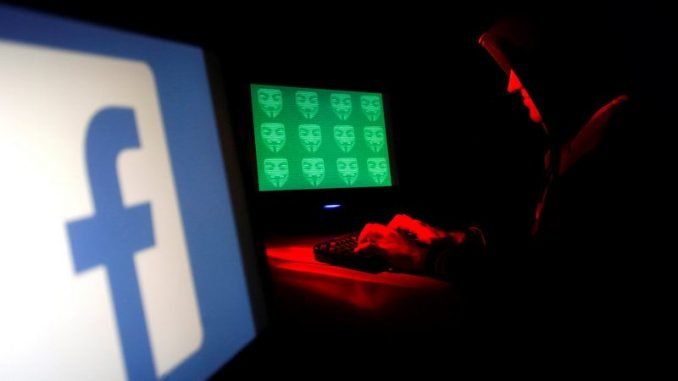
A day before Facebook announced that it had discovered and disabled a propaganda campaign designed to sow dissension among US voters, it exclusively shared some of the suspicious pages with an online forensics team so busy it hasn’t put a nameplate on the door.
The Atlantic Council’s Digital Forensic Research Lab is based in a 12-foot-by-12-foot office in the Washington, DC, headquarters of the nearly 60-year-old Council, a think tank devoted to studying serious and at times obscure international issues.
Facebook is using the group to enhance its investigations of foreign interference. Last week, the company said it took down 32 suspicious pages and accounts that purported to be run by leftists and minority activists. While some US officials said they were likely the work of Russian agents, Facebook said it did not know for sure.
It fell to the lab to point out similarities to fake Russian pages from 2016 during Facebook’s news conference last week.
Facebook began looking for outside help amid criticism for failing to rein in Russian propaganda ahead of the 2016 presidential elections. The US Justice Department won indictments against 13 Russians and three companies for using social media in that election to influence voters. US President Donald Trump’s national security team warned last week of persistent attempts by Russia to use social media against the 2018 congressional elections as well.
Outside help
With scores of its own cybersecurity professionals and $40 billion (roughly Rs. 2.7 lakh crores) in annual revenue in 2017, Facebook might not seem in need of outside help.
But the lab and Atlantic Council bring geopolitical expertise and allow Facebook to distance itself from sensitive pronouncements. On last week’s call with reporters, Alex Stamos, Facebook’s chief security officer, said the company should not be expected to identify or blame specific governments for all the campaigns it detects.
“Companies like ours don’t have the necessary information to evaluate the relationship between political motivations that we infer about an adversary and the political goals of a nation-state,” said Stamos, who is leaving the company this month for a post at Stanford University. Instead, he said Facebook would stick to amassing digital evidence and turning it over to authorities and researchers.
It would also be awkward for Facebook to accuse a government of wrongdoing when the company is trying to enter or expand in a market under that government’s control.
Facebook donated an undisclosed amount to the lab in May that was enough, said Graham Brookie, who runs the lab, to vault the company to the top of the Atlantic Council’s donor list, alongside the British government.
Facebook employees said privately over the past several months that Chief Executive Mark Zuckerberg wants to outsource many of the most sensitive political decisions, leaving fact-checking to media groups and geopolitics to think tanks. The more he succeeds, the fewer complications for Facebook’s expansion, the smaller its payroll, and the more plausible its positioning as a neutral platform. Facebook did not respond to a request for comment.
Exposing disinformation
The lab was founded by Brookie, a National Security Council advisor in the last four years of the Obama administration. Ben Nimmo is a co-founder. He joined after stints as a journalist covering the Baltic states as they sparred with Russia a decade ago and as a spokesman for NATO on Russia and Ukraine.
On a recent visit to the head office, the often-travelling Washington staff of four were packed around three desks pushed to the centre of the room.
Aloud and on Slack, the workplace chat room app, they discussed pending articles they were publishing on the news and opinion website Medium about disinformation operations in Brazil, the United States and Pakistan.
Using its own software and other tools, the team sorts through social media postings for patterns. Then it adds geopolitical context to tell stories on Medium about misinformation campaigns early, before they play out.
The combination of urgency and analysis has pushed the young lab to the front line of deciphering state-sponsored and domestically generated misinformation. Even before the Atlantic Council created it 2016, the team drew attention in Washington policy circles and beyond for using crowdsourcing and technology to challenge the claims of nation-states. It first got attention using geo-tagged selfies to show Russian soldiers were in Ukraine, which added to evidence there was no populist uprising there.
During the recent Mexican presidential election, the lab worked with a media consortium, Verificado, that included Al Jazeera and Mexico’s Animal Politico, to debunk wild rumours about candidates’ illicit foreign support, Nazi relatives and plans to ban junk food. On its own, the lab also rooted out a paid influence campaigner relying on automated accounts.
“If you wait for something to happen, it’s going to be too late,” Nimmo said. “You have to put verified information into the environment first.”
[“source=gadgets.ndtv”]
